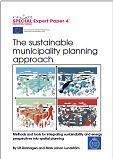Paper - Special Paper 4: "The sustainable municipality planning approach" by Ulf Ranhagen and Mats Johan Lundström / 2016
SPECIAL Project Expert Papers - Part of the legacy of the SPECIAL is a series of six Expert Papers written by six different partners in the project. Five of these papers are already available as downloads. Ranging in topics from Masterplanning and Energy, to Policy frameworks and Transport, the papers are primarily targeted at town planners working at the local level.
Published by the Town and Country Planning Association, 2 March 2016
"The sustainable municipality planning approach.Methods and tools for integrating sustainability and energy perspectives into spatial planning By Ulf Ranhagen and Mats Johan LundströmMethods and tools for integrating sustainability and energy perspectives into spatial planning" By Ulf Ranhagen and Mats Johan Lundström
Introduction
The Sustainable Municipality Planning Approach (SMPA) is a process-oriented planning concept involving ideas and methodology drawn from various schools of thought, and combining collaborative, communicative, rational and strategic planning ideas and approaches. The SMPA’s main purpose is to promote inclusive cross-sectoral planning processes that integrate the energy perspective into spatial planning – or the spatial perspective into energy strategies – and to support sustainable spatial development in general.
The SMPA is the product of various research and development projects, and experience gained from planning practice, led by one of the authors of this Expert Paper (Ulf Ranhagen). Working with practitioners and other researchers, it has been continuously developed for over a decade. The first stage in its evolution was the
Swedish Sustainable City concept, launched at the World Summit on Sustainable Development in Johannesburg in 20021 and later re-named SymbioCity. The approach was further developed in collaboration with municipal practitioners as part of the Swedish Energy Agency’s Sustainable Municipality research and development
programme (running from 2003 to 2012), combining the general sustainability planning approach with targeted tools and methods for integrating energy considerations into urban planning. The SMPA approach has continued to be
developed, especially within the SPECIAL project.
The emphasis is on capitalising on informal opportunities in addition to – or within the framework of – addressing the necessary formalities required in planning. It aims to go beyond procedural formalities and analyses, focusing on the creative development of proposals on sustainability issues and, in particular, on planning for energy for commercial and domestic heat, power and transport.

